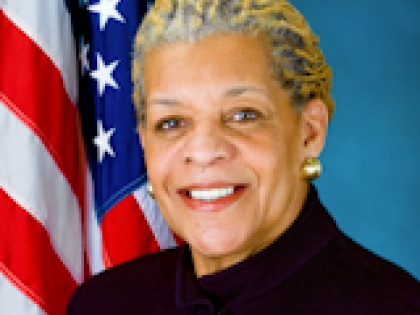
Senator Ruth Hassell-Thompson Announces Three-Way Agreement to Reform Rockefeller Drug Laws
Ruth Hassell-Thompson
March 31, 2009
(Albany, NY)- Senator Ruth Hassell-Thompson praised Governor David A. Paterson, and members of the Senate and the Assembly for the historic three-way agreement to the Rockefeller Drug Laws. The agreement eliminates the ineffective and outdated sentencing law and focuses on treatment rather than punishment to end the deadly cycle of drug addiction.
The bill will greatly expand drug treatment programs and gives judges ultimate authority to divert non-violent addicts to treatment. This measure will save taxpayers millions of dollars while providing those who are addicted with the necessary tools to fight their addiction. The bill strikes a careful and appropriate balance to ensure that non-violent addicted offenders get the treatment they need, and predatory kingpins will receive the punishment they deserve. Most importantly, this agreement ends the cycle of addiction and recidivism.
"The Governor and the Legislature have agreed on a major change in public policy, and have created a balanced approach to drug addiction and crime," said Senator Ruth Hassell-Thompson (D-Mount Vernon), Chair of the Senate Crime Victims, Crime and Corrections Committee. "Our ability to reduce the flow of drugs in our communities is dependent on our ability to reduce the demand. We are now shifting resources to treat drug addiction as a medical problem. By diverting addicts to drug treatment courts we believe we can get people off drugs and thereby reduce the demand for them. Study after study shows that our policies will make our communities safer and save the tax payers millions of dollars. Today, we begin anew, offering offenders an opportunity to receive treatment, while maintaining that the safety and security of our neighborhoods, cities, and state remains paramount."
There are three significant pieces of the agreement.
1) It would create a drug treatment program to be administered by drug court judges.
Under this program, judges will have discretion to place addicted first and second-time drug offenders into judicially-approved alcohol and substance abuse treatment – over the objections of prosecutors. It also gives judges ultimate discretion to determine an appropriate penalty for those offenders who are unable to succeed in the treatment program.
The bill maximizes an addicted offender's chance of success in overcoming addiction, by relying on New York's highly successful drug courts to administer the new treatment model. The specially-trained drug court judges often build relationships with offenders, which greatly improves their chances of succeeding. Drug court judges are known for closely monitoring the addicted offenders' progress and rewarding their success. Drug courts are also staffed with case managers and vocational and employment specialists to assist offenders in obtaining education and jobs.
Judges have the authority, for the first time, to dismiss all charges or seal the arrest and conviction records of offenders who successfully complete a judicially-sanctioned treatment program. It also recognizes that relapses are often part of recovery from long-term drug addiction. It would require judges to consider whether a non-incarceratory remedy, such as heightened supervision or more frequent testing and treatment, could effectively be used if an offender under court supervision suffers a relapse.
Recognizing that some offenders may require more supervision than can be provided through community-based drug treatment programs, the bill expands the use of programs such as the "shock" incarceration program and the Willard drug treatment program, to give judges additional sentencing options for these offenders. The bill also permits the Division of Parole to discharge from continued parole supervision those drug offenders who have demonstrated success and rehabilitation while serving a term of post-release supervision.
2) The bill relieves new offenders from some of the old Rockefeller Drug Law's mandatory sentencing provisions and provides additional relief to offenders who remain incarcerated under the old laws.
The bill eliminates mandatory state prison sentences for first-time class B felony drug offenders and second-time non-violent class C, D and E drug offenders, making them eligible for a term of probation that could also include drug treatment or a local jail sentence. It also permits class B drug felons who meet eligibility criteria and who are currently serving Rockefeller Drug Law sentences to enter the six-month shock incarceration program when they are within three years of release. If successful, they would be entitled to early release from prison.
The bill also requires the Board of Parole to consider current, lower sentencing ranges when deciding whether to release a class B drug offender to parole supervision.
3) The bill would ensure that offenders who are not addicted, but who profit from the addictions of others are appropriately sentenced to state prison.
As part of the effort to target drug kingpins, this legislation creates a new drug "kingpin" offense that targets organized drug traffickers who profit from and prey on the vulnerabilities of addicted users who often relapse.
The bill creates new crimes to ensure that adults who sell drugs to children are appropriately required to serve time in state prison, as well as retains mandatory prison sentences for class B predicate drug offenders.



